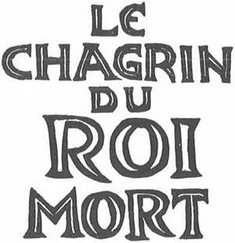Jean-Claude Mourlevat - Winter's End
Здесь есть возможность читать онлайн «Jean-Claude Mourlevat - Winter's End» весь текст электронной книги совершенно бесплатно (целиком полную версию без сокращений). В некоторых случаях можно слушать аудио, скачать через торрент в формате fb2 и присутствует краткое содержание. Год выпуска: 2010, ISBN: 2010, Издательство: Candlewick, Жанр: Старинная литература, на английском языке. Описание произведения, (предисловие) а так же отзывы посетителей доступны на портале библиотеки ЛибКат.
- Название:Winter's End
- Автор:
- Издательство:Candlewick
- Жанр:
- Год:2010
- ISBN:9780763651749
- Рейтинг книги:5 / 5. Голосов: 1
-
Избранное:Добавить в избранное
- Отзывы:
-
Ваша оценка:
- 100
- 1
- 2
- 3
- 4
- 5
Winter's End: краткое содержание, описание и аннотация
Предлагаем к чтению аннотацию, описание, краткое содержание или предисловие (зависит от того, что написал сам автор книги «Winter's End»). Если вы не нашли необходимую информацию о книге — напишите в комментариях, мы постараемся отыскать её.
Winter's End — читать онлайн бесплатно полную книгу (весь текст) целиком
Ниже представлен текст книги, разбитый по страницам. Система сохранения места последней прочитанной страницы, позволяет с удобством читать онлайн бесплатно книгу «Winter's End», без необходимости каждый раз заново искать на чём Вы остановились. Поставьте закладку, и сможете в любой момент перейти на страницу, на которой закончили чтение.
Интервал:
Закладка:
On the second floor, she went to Bartolomeo’s door, and saw that it too had been forced open. She glanced inside the room, where the same chaos reigned as in Milena’s after the barbarians had ransacked it. Objects were lying around on the floor, broken and crushed underfoot. Her stomach muscles cramped with fear: what would happen if her two friends ever fell into the hands of these men?
The two restaurant rooms were empty. Helen took the elevator down to the basement. In the silence its iron machinery seemed louder than ever. Passing through the kitchens, she finally heard a faint sound coming from the staff canteen, and then voices. She opened the door and saw about thirty of her fellow workers sitting there, crammed into a space too small for them. They were in the middle of such a lively discussion that they hardly noticed her arrival.
“We can manage the meals no problem without Lando,” a boy sitting at the corner of the table was saying. “I mean, we’re not total idiots!”
“It’s not a matter of being idiots or not,” said another boy, wearing a warehouse man’s gray apron. “It depends on whether we can serve the customers anything. The suppliers know that Mr. Jahn has gone away, and we haven’t had half this morning’s deliveries: no vegetables, no bread. So what do you think we’re going to give people?”
A young woman leaning on a cupboard said placidly, “I’m perfectly happy to serve anything we have, but I don’t think anyone’s likely to turn up. They say the factory’s on strike.”
“Exactly,” agreed a man beside her, smoking a cigarette. “There was a scuffle at the entrance.”
“So what are we going to do?” one girl asked.
The discussion went around in circles like this for several minutes, until a young man of about twenty suddenly got up on his chair. He was clearly angry. “Look, I’m sorry, but you’re really getting me down with all this talk about vegetable deliveries!” he cried. “Going on about carrots and potatoes when people were putting up the barricades last night. You heard them too, I suppose. What are we waiting for? Let’s get moving!”
“Hear, hear!” another young man agreed. “I’ve no intention of sitting here twiddling my thumbs. I’m off into town to see what’s going on. Coming?”
The two of them put on their jackets and marched out.
“Be careful!” the boy smoking the cigarette called after them. “They’re saying people died last night!”
There was a long and weighty silence.
“I wonder what Mr. Jahn would say,” one of the cooks, a girl in a white apron, said with a sigh.
“What would he say?” replied another girl, getting to her feet. “He’d say he’s not our father, and maybe we should learn to manage without him. And not be scared anymore! Those two boys are right. I’m going after them. Who’s coming with me?”
It was Rachel, a friend of Dora’s. Helen knew her well.
“I’ll come,” she said, surprised to find herself so bold.
Going along the corridor to her room, she felt a sense of elation. There were three days left before the winter fights. Only three days. But suppose the revolution was already beginning? Suppose the city was suddenly in chaos? Wouldn’t the Phalangists have more urgent things on their minds than going to watch gladiators die? Surely they would! They wouldn’t go to the arena. They’d stay away and the fights would be canceled! For the first time in months, she saw hope ahead. A faint hope, but a real one.
Looking around her little room at her few ornaments, the two bookshelves, her clothes hanging from the cord, she asked herself an unusual question: what do you take with you when you’re a girl of seventeen going off to build barricades in the street to save your lover? Unable to come up with any satisfactory answer, she put on her brightly col ored cap, her scarf, and her winter coat, and set off.
The other three were waiting for her outside the restaurant. They conferred briefly and decided to go to the factory. From a distance they saw that the tall gates were guarded by a dozen armed militiamen. They turned away and went along small streets, taking care not to slip on the black ice. The boy who had spurred them into action in the canteen was still talking passionately. “They want to prevent crowds from gathering, but they won’t do it! We only need people to stop being frightened and come out into the street, that’s all!”
“Don’t talk so loud,” the other boy warned him.
“I’ll talk any way I like,” his friend retorted. “I’ve kept my mouth shut for years and I’m sick and tired of it, do you hear? Sick and tired!” He shouted it out at the top of his voice, and then roared with laughter. “Oh, how good that feels! Why don’t you all try it?”
Luckily, the tram was running normally. They boarded it, and immediately noticed three militiamen sitting at the back, clubs in their hands and pistols at their belts. The enthusiastic boy calmed down a little but still stared defiantly at them.
“Got a problem?” inquired one of the men.
“No, just admiring your uniform,” replied the boy. He not only had the gift of gab; he had guts too. The few passengers on the tram smiled, and the militiaman clenched his jaw.
As they approached the city center down the long avenue leading to Opera House Square, the tram filled up more at every stop. Helen thought there was a special kind of excitement on the passengers’ faces, as if they were waiting for something. Or was she just imagining it? She leaned her forehead against the cold window. The tram stopped.
“Shall we get out here?” asked Rachel.
“At the next stop,” one of the two boys said.
The automatic doors were just closing again when Helen froze, transfixed. There on the sidewalk — on the other side of the road! No, she couldn’t be dreaming. . . .
“Wait!” she cried, leaping to her feet. “Open the doors! Let me out! Please!”
Frantically, she pulled the stop cord. Rachel took her arm, “Helen, what is it?”
“Over there. I saw . . .” Helen murmured.
As the tram set off again, she jostled passengers aside and went to stare out of the back window, ignoring the militiamen and moving so impetuously that they made way for her. The two figures were disappearing down a little side street. She didn’t know one of them, an old woman walking unsteadily, dressed in black and holding a shopping bag, but the other . . . She could have sworn . . . ! How could she mistake that face? She’d have known it among a hundred thousand! She was just in time to see them go through the front door of an apartment building — the second in the street, she thought — and then disappear from sight.
“What did you see?” Rachel asked again.
“Someone I know! But I can hardly believe it.”
The tram was packed now. The journey between the two stops seemed to last hours. Helen made her way to the doors and jumped out as soon as they opened.
“I’m off!” she called to the other three, and then she ran back along the sidewalk, her heart thudding.
Suppose she was wrong? No, there couldn’t possibly be such a likeness! Back at the last tram stop, she set off breathlessly along the side street, which rose up a slight slope. The apartment building had a gray facade. She was certain, as she opened the second door inside the entrance, that this was where the two figures had disappeared. A dark corridor lay ahead of her. She tried the light switch, but it wasn’t working, and she groped her way on until she reached a small yard with broken paving. Dingy grass grew in the cracks, and there were dustbins standing around. Close as it was to the big avenue, the place seemed to be in a bad state. Two staircases led to the upper floors. At random, she chose the one on the left, a blackened spiral staircase. There was a smell of mold.
Читать дальшеИнтервал:
Закладка:
Похожие книги на «Winter's End»
Представляем Вашему вниманию похожие книги на «Winter's End» списком для выбора. Мы отобрали схожую по названию и смыслу литературу в надежде предоставить читателям больше вариантов отыскать новые, интересные, ещё непрочитанные произведения.
Обсуждение, отзывы о книге «Winter's End» и просто собственные мнения читателей. Оставьте ваши комментарии, напишите, что Вы думаете о произведении, его смысле или главных героях. Укажите что конкретно понравилось, а что нет, и почему Вы так считаете.












